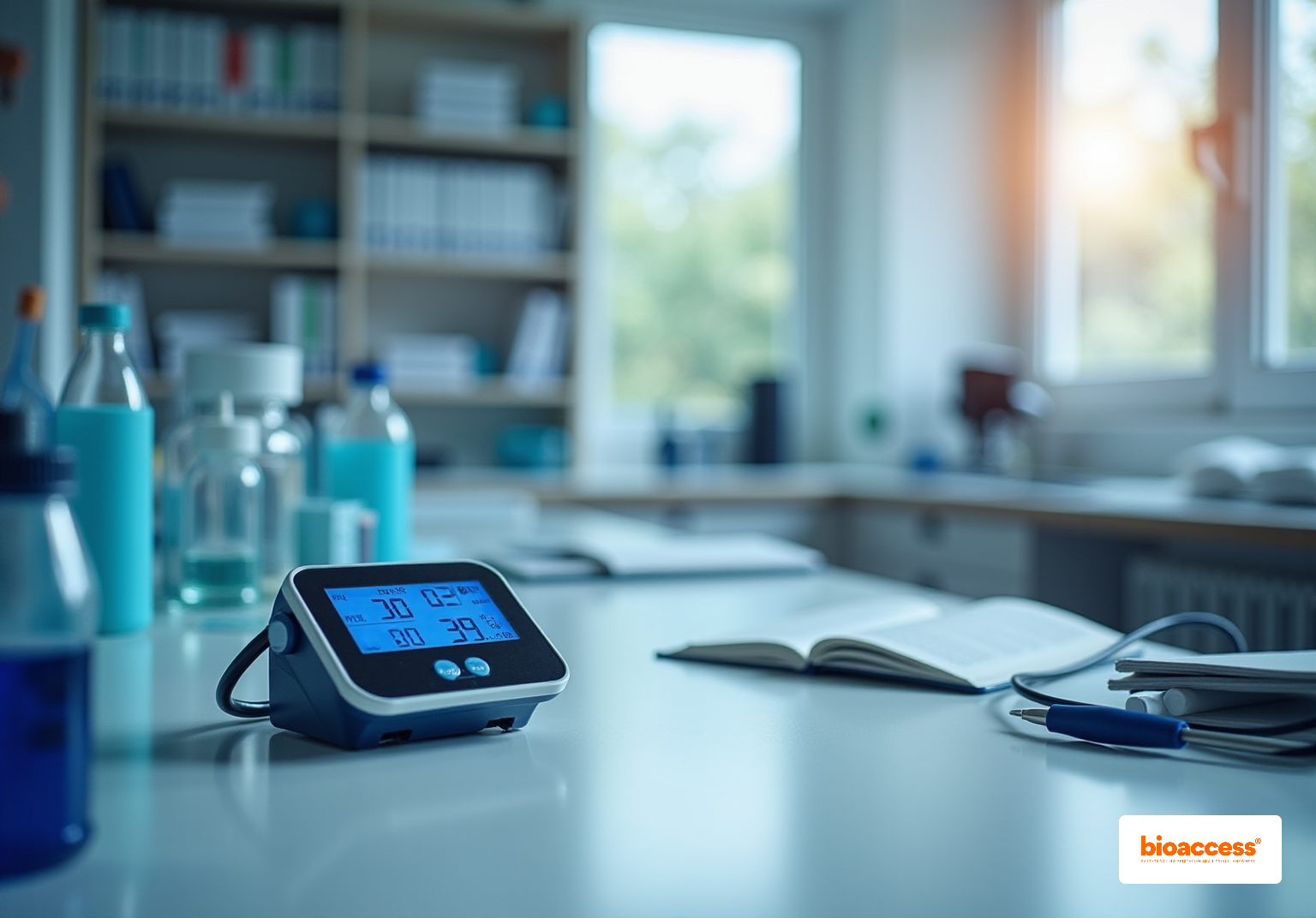


This article elucidates the critical distinction between accuracy and precision in clinical research. Accuracy pertains to the degree to which measurements correspond with the true value, whereas precision reflects the consistency of repeated measurements. Understanding this differentiation is vital for achieving reliable research outcomes.
Inaccuracies can lead to flawed conclusions and potentially harmful treatments, underscoring the necessity for meticulous data management and calibration in medical studies.
By grasping these concepts, researchers can enhance the integrity of their findings and contribute to safer medical practices.
In the realm of clinical research, the distinction between accuracy and precision holds profound implications for study outcomes and patient safety. This understanding transcends mere academic interest; it is crucial for yielding reliable results that pave the way for effective treatments. Yet, many researchers find themselves grappling with the nuances of these terms, which can lead to flawed conclusions and jeopardized patient care.
How can researchers adeptly navigate the complexities of accuracy and precision to bolster the integrity of their findings and ultimately enhance healthcare outcomes?
In medical research, the precision of a measured value is often discussed in terms of the difference between accurate and precise, which refers to how closely the measured value aligns with the true value or actual parameter being examined. This concept is crucial for ensuring reliable research outcomes.
Statistically, correctness can be expressed as the sum of true positives and true negatives divided by the total number of cases. For instance, in a clinical trial assessing blood pressure, precision indicates how closely the recorded blood pressure aligns with the patient's actual blood pressure. Conversely, the difference between accurate and precise is related to the consistency of repeated measurements.
It is defined as the ratio of true positives to the sum of true positives and false positives. If several blood pressure readings produce comparable results, those measurements are considered precise, illustrating the difference between accurate and precise, regardless of their correctness.
Therefore, the difference between accurate and precise highlights that exactness emphasizes correctness, while specificity concentrates on consistency. Both concepts are vital for ensuring reliable research outcomes, as reliability involves the ability to replicate study findings across different researchers or laboratories.
Additionally, understanding the potential for bias in measurements is crucial, as bias can systematically affect results, leading to inaccuracies. A comprehensive grasp of the differences between exactness and clarity is essential for researchers aiming to obtain valid and trustworthy results.
In medical studies, prioritizing both accuracy and exactness can significantly enhance the integrity of findings and ultimately improve patient care.
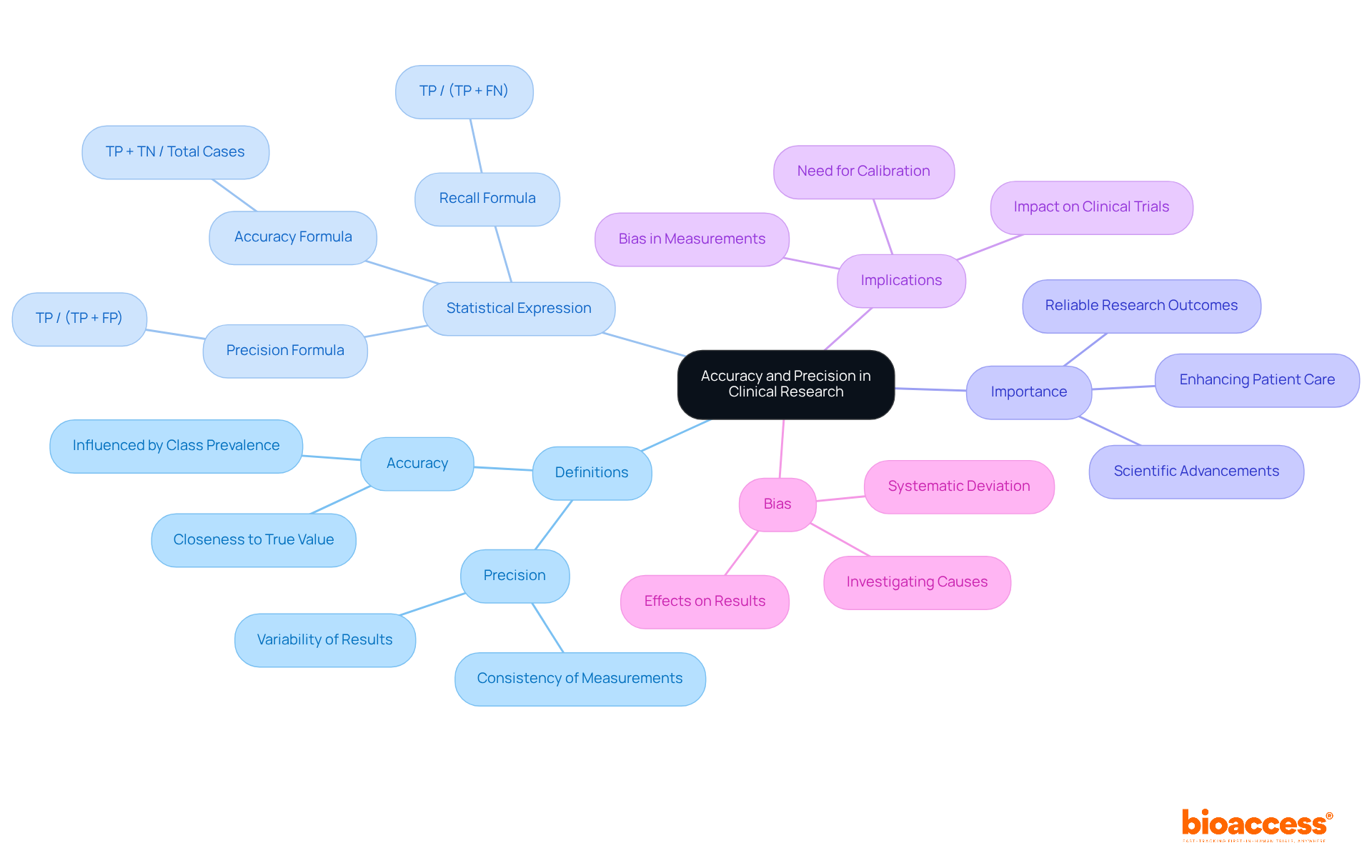
The difference between accurate and precise measurements is crucial to the integrity of medical studies, significantly influencing the validity of research findings. Inaccurate measurements can lead to flawed conclusions, resulting in ineffective or even harmful treatments. Studies indicate that approximately 30% of medical experiments fail due to information-related issues, underscoring the necessity for meticulous data management. Precision ensures that results are reproducible, which is crucial for regulatory approval and fostering trust within the scientific community. In research studies, where patient safety is essential, inaccuracies can result in improper dosing or treatment choices, potentially compromising patient welfare. Thus, maintaining high standards of accuracy and precision is not merely a best practice; it is a vital necessity in medical research to ensure dependable results and to recognize the difference between accurate and precise, thereby protecting patient safety.
Additionally, bioaccess® is dedicated to upholding these standards through extensive research study management services, including:
By employing advanced methodologies and technologies, such as electronic data capture systems, bioaccess minimizes human error and enhances data consistency, ensuring the integrity of clinical trials.
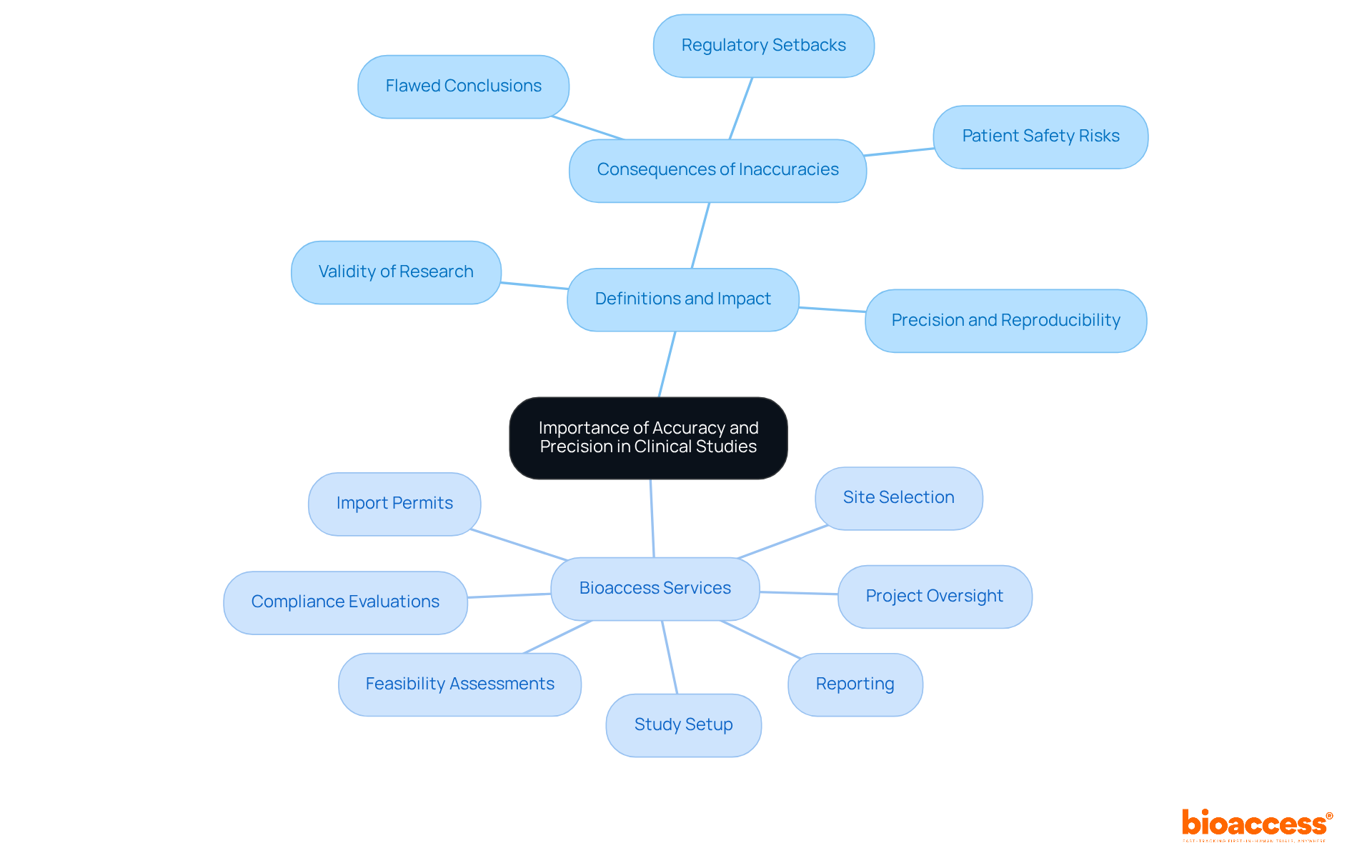
To assess the difference between accurate and precise results in clinical research, it is imperative for researchers to contrast their findings with established standards or controls.
Utilizing calibrated instruments is essential for understanding the difference between accurate and precise measurements. Regular calibration and maintenance of equipment are critical for understanding the difference between accurate and precise.
For achieving accuracy, it is vital to understand the difference between accurate and precise, which involves performing repeated measurements and calculating the standard deviation; a lower standard deviation signifies greater accuracy.
Improving accuracy requires consistent methodologies and comprehensive training for staff to understand the difference between accurate and precise techniques.
Furthermore, employing statistical methods such as confidence intervals can effectively evaluate the difference between accurate and precise results in research findings.
By implementing these methods, researchers can secure more trustworthy and accurate outcomes in studies, ultimately advancing the field of medical research.
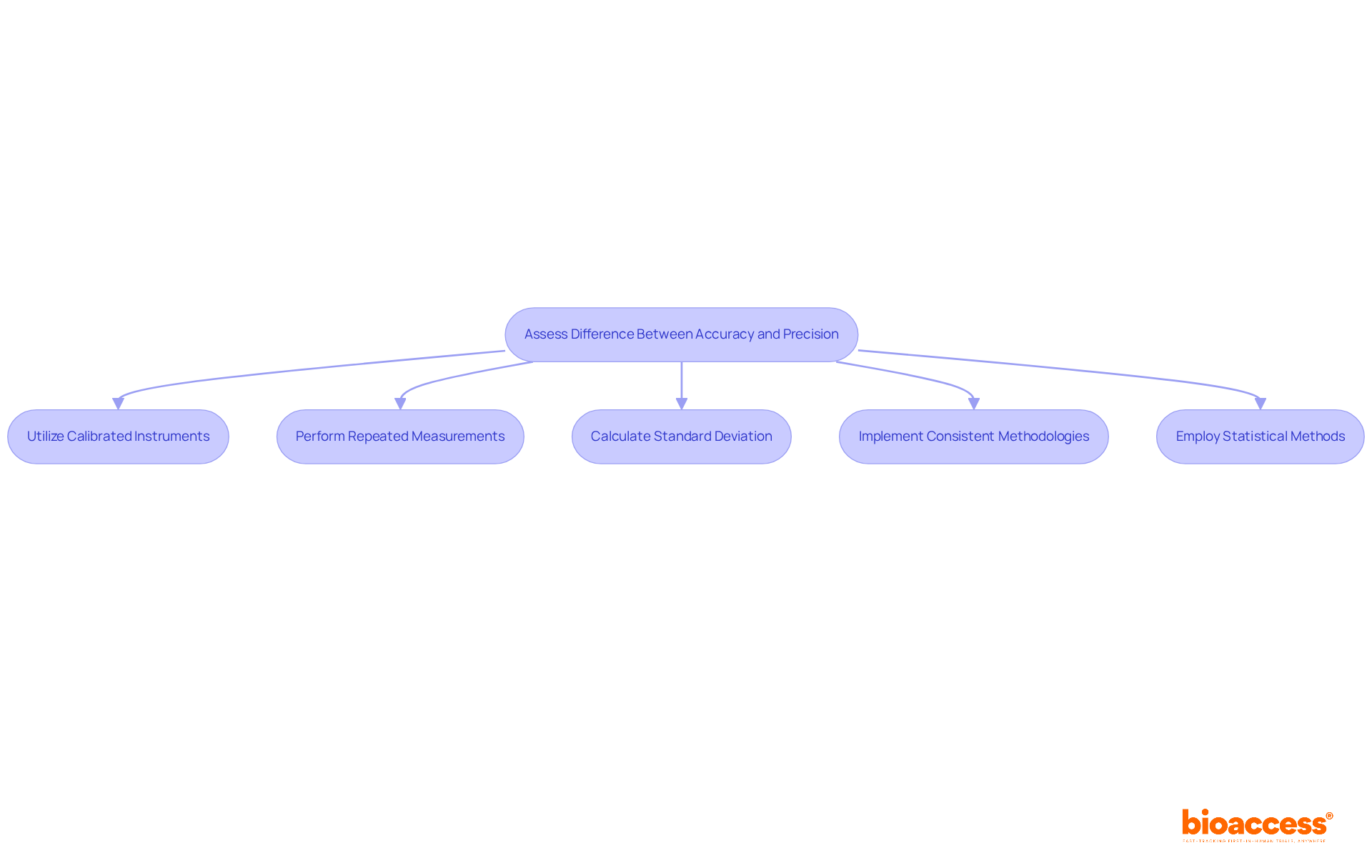
A significant case study involved a clinical examination for a new diabetes medication, where researchers faced challenges due to incorrect blood glucose measurements from improperly calibrated devices. This situation resulted in deceptive outcomes, undermining the integrity of the examination. However, after recalibrating their equipment and enforcing stricter measurement protocols, the team achieved enhanced accuracy, culminating in a successful trial outcome.
In another case, a study centered on a new cancer therapy underscored the importance of accuracy. Researchers performed multiple measurements of tumor size using advanced imaging techniques. By standardizing imaging protocols and providing extensive training for personnel, they greatly enhanced measurement accuracy. This meticulous approach ultimately facilitated a clearer understanding of the treatment's effectiveness.
These case studies illustrate the profound impact of the difference between accurate and precise on the reliability of research results, highlighting the necessity for strict methodologies in medical studies. By utilizing extensive research management services, including:
bioaccess ensures that studies yield significant insights. Furthermore, employing advanced methodologies, such as electronic data capture systems, can enhance accuracy and precision, ensuring that clinical trials not only contribute to scientific knowledge but also foster job creation, economic growth, and healthcare improvement within local economies.
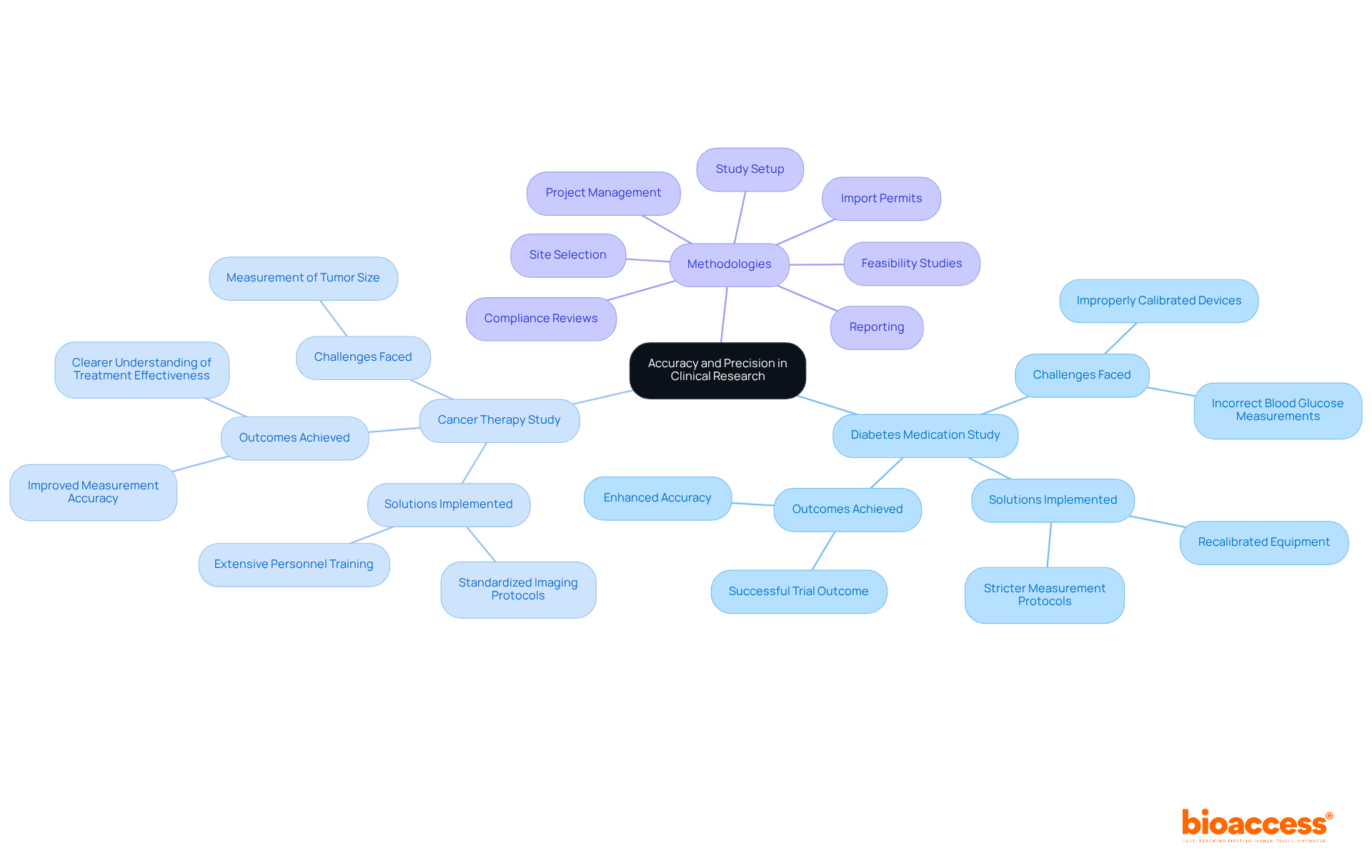
Understanding the distinction between accuracy and precision is essential for ensuring the reliability of research outcomes in clinical studies. Accurate measurements align closely with true values, while precise measurements demonstrate consistency across repeated trials. Both aspects are crucial for maintaining the integrity of research, as they directly impact the validity of findings and, ultimately, patient safety.
Key insights from the discussion emphasize that inaccuracies can lead to flawed conclusions, affecting treatment efficacy and patient care. Meticulous data management, proper calibration of instruments, and rigorous training for researchers can significantly enhance both accuracy and precision. Moreover, real-world case studies illustrate the tangible consequences of neglecting these principles, showcasing how systematic approaches can lead to successful trial outcomes and improved healthcare solutions.
The significance of accuracy and precision in clinical research cannot be overstated. Researchers are encouraged to adopt best practices and employ advanced methodologies to ensure their findings contribute meaningfully to medical science. By prioritizing these elements, the integrity of clinical studies can be upheld, ultimately leading to better patient outcomes and advancements in healthcare.
What is the difference between accuracy and precision in clinical research?
Accuracy refers to how closely a measured value aligns with the true value or actual parameter being examined, while precision indicates the consistency of repeated measurements.
How is accuracy statistically expressed in clinical research?
Accuracy can be expressed as the sum of true positives and true negatives divided by the total number of cases.
Can you provide an example of precision in a clinical trial?
In a clinical trial assessing blood pressure, precision indicates how closely the recorded blood pressure aligns with the patient's actual blood pressure.
What does it mean if blood pressure readings are precise?
If several blood pressure readings produce comparable results, those measurements are considered precise, regardless of their accuracy.
Why are accuracy and precision important in clinical research?
Both concepts are vital for ensuring reliable research outcomes, as they help in replicating study findings across different researchers or laboratories.
How does bias affect measurements in clinical research?
Bias can systematically affect results, leading to inaccuracies, which is why understanding the potential for bias is crucial for obtaining valid and trustworthy results.
What is the significance of prioritizing accuracy and precision in medical studies?
Prioritizing both accuracy and precision can significantly enhance the integrity of findings and ultimately improve patient care.